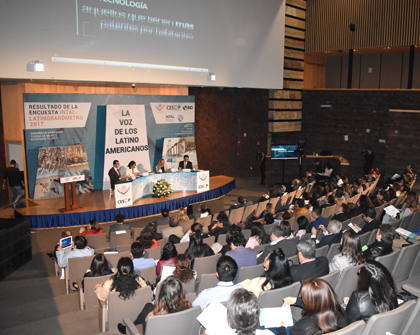As part of the survey carried out by the alliance between the Institute for the Integration of Latin America and the Caribbean (INTAL) and Latinobarómetro (link in Spanish), Latin Americans answered on how integration affects their lives.
The perception survey, which is part of the Continuous Monitoring System for Regional Integration Processes in Latin America (SEPI), a regional public good (RPG), provided conclusive results in relation to the positive impact of integration on access to technology.
Answers reflected two types of impact, positive and negative. Of the positive impacts, technology (66%) topped the list as the most widely chosen option, followed by exports (58%) and foreign investment (55%). In terms of negative impacts, citizen security was mentioned in 45% of all answers.
Figure 1. Perceived Impact of Integration Strategies. Regional Total
Question: Over the last five years (country) has been following a global integration strategy. Do you think this strategy has had a positive or negative impact on…? (percentage of total answers)
Not only did answers differ in relation to people’s opinions on the impact or implications of integration, but there was also significant dispersion between countries for each answer. By way of example, 58% of Venezuelan respondents answered that integration had a negative impact on their personal or household financial situation, but only 17% of Nicaraguans said so, a marked difference. The mapping of net impacts by country provides a clear picture of each area.
Figure 2. Perception of the Impact of Integration Strategies on the Areas of Citizen Security and Access to Technology. Total per country
Question: Over the last five years (country) has been following a global integration strategy. Do you think this strategy has had a positive or negative impact on citizen security/access to technology or are you not in a position to give an opinion?
After technology, the positive impacts on exports and investment were what respondents valued most, although this was truer for South Americans than for Central Americans. Respondents from El Salvador and Guatemala considered that the impacts on external sales and investment inflows were positive, although they did not consider them to be as significant as the rest of the Central American respondents did. Similarly, respondents from Argentina valued these items but to a lesser extent than other South Americans.
Figure 3. Perception of the Impact of Integration Strategies on Exports and Foreign Investment. Total per country
Question: Over the last five years (country) has been following a global integration strategy. Do you think this strategy has had a positive or negative impact on exports/foreign investment or are you not in a position to give an opinion?
In terms of the impact of integration on jobs and household financial situation, the results were more heterogeneous. On average, integration was perceived as having a more positive impact on employment than on household financial situation. In Argentina, El Salvador, and Guatemala, integration was perceived positively in terms of its effect on employment, although little significance was attached to it; in contrast, in Uruguay, Chile, and the Dominican Republic, this impact was considered to be very positive. Likewise, countries that perceived integration as having a positive effect on employment also considered that it had a positive effect on household financial situation, although to a lesser extent.
Figure 4. Perception of the Impact of Integration Strategies on Job Sources and the Economic Situation. Total per country
Question: Over the last five years (country) has been following a global integration strategy. Do you think this strategy has had a positive or negative impact on your job or source of employment/personal and household financial situation or are you not in a position to give an opinion?
The results of the survey can be seen in full on the Summer Colloquium website (link in Spanish): a preliminary analysis of the 2015 results were presented at this event and the foundations were laid for the 2016 version of the survey.








